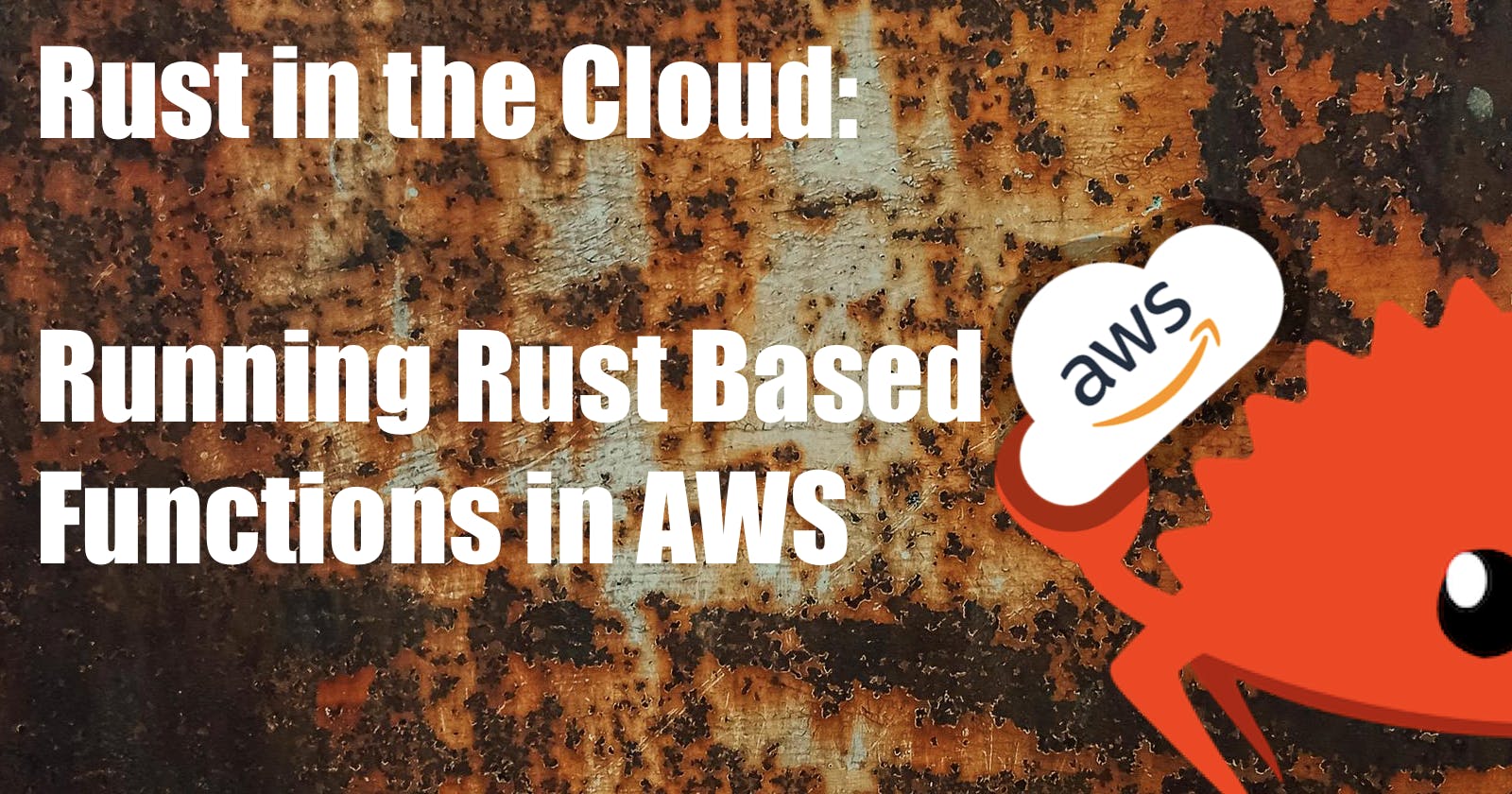TL;DR: Le Code:
Introduction
This blog post is all about running Rust-based functions on AWS Lambda. Will see, how much effort is required to get started and what the pros and cons are. If you are already familiar with AWS Lambdas, you may know that AWS Lambdas offers a variety of runtimes. A runtime provides a language-specific environment to run your function in. You can use this AWS provided runtimes, or you can build your own.
Now comes the interesting part for us: Because Rust is compiled to native code, we do not need a dedicated runtime to run our Rust code. We will use instead the Rust runtime client to build locally (or in your CI system) and then upload the binary using the AWS CLI by defining the AWS Lambda function. As runtime, we will use provided.al2 which is a runtime that does not include any language-specific dependencies.
The demo code? A simple function that returns as AI-generated Dad Joke. The function will give us some, hopefully, funny dad jokes.
Additionally, we cross-compile our lambda function to arm64 architecture to profit from the AWS Graviton processor. Graviton-based instances offer the best bang for your buck and are up to 40% cheaper than Intel-based solutions.
You are new to Rust and stumbled over this blog article? I have a whole series of blog posts about rust, if you are interested in more, check out my Rust 🦀 series:
Why AWS CLI?
You may ask yourself: Why we are not using an infrastructure as code tool like to define and deploy our AWS Lambda function?
The reason is simple: I want to keep the blog post as simple as possible. We will use Pulumi later in some more sophisticated blog posts. For now, we will use the AWS CLI to define our AWS Lambda function. Stay tuned for more to come.
Prerequisites
To follow this blog post, you should have a basic understanding of Rust and the Cargo build tool. If you are new to Rust check out my blog post:
Before we start, we need to make sure we have the following tools installed:
An IDE or text editor of your choice
AWS account (free tier is enough)
AWS CLI
ChatGPT API key (No need for ChatGPT Plus)
Create a new Rust project
Before we can start with the rust code, we need to install the cargo-lambda Cargo plugin. As I am using a Mac, I will use brew to install the plugin.
If you are using a different OS, check out the Getting started section of the official documentation.
brew tap cargo-lambda/cargo-lambda
brew install cargo-lambda
Now we can create our function by running the cargo-lambda with the subcommand new.
cargo lambda new dadjoke
You will be asked a few questions. I have answered them as follows:
cargo lambda new dadjoke
> Is this function an HTTP function? Yes
This will generate a new Rust project inside the folder named dadjoke.
Change into the newly created folder and add our chatgpt_rs crate using the cargo add command.
cd dadjoke
cargo add chatgpt_rs
Open the src/main.rs file and replace the existing content with the following code, as we want to access the ChatGPT API to generate AI-generated Dad Jokes for us.
use chatgpt::prelude::ChatGPT;
use chatgpt::types::CompletionResponse;
use lambda_http::{run, service_fn, Error, Request, Response};
async fn function_handler(_: Request) -> Result<Response<String>, Error> {
let chatgpt_api_key = std::env::var("CHATGPT_API_KEY").expect("env variable `CHATGPT_API_KEY` should be set");
let client = ChatGPT::new(chatgpt_api_key)?;
let response: CompletionResponse = client
.send_message("Imagine you are a dad and tell a good dad joke, tell only the joke without any other text, all in one line without line breaks:")
.await.unwrap();
let mut reponse_string = response.message().content.to_string();
reponse_string = reponse_string.replace("\n", "");
println!("{}", reponse_string);
let resp = Response::builder()
.status(200)
.header("content-type", "text/html")
.body(reponse_string)
.map_err(Box::new)?;
Ok(resp)
}
#[tokio::main]
async fn main() -> Result<(), Error> {
tracing_subscriber::fmt()
.with_max_level(tracing::Level::INFO)
.with_target(false)
.without_time()
.init();
run(service_fn(function_handler)).await
}
The main action happens in the function_handler function. The API key is provided via the environment variable CHATGPT_API_KEY. We will set this variable later when we deploy our function to AWS Lambda. We then make a non-streaming call to ChatGPT to give us a dad joke back. I use the following phrase to give the AI the right context from the start:
Imagine you are a dad and tell a good dad joke, tell only the joke without any other text, all in one line without line breaks:
Build and Test Our Function Locally
Before we deploy our function to AWS, we want to test it locally to be sure it works as expected. To do so, the cargo lambda subcommand watch offers us a very easy way to build our function and start a local HTTP server on the port 9000.
export CHATGPT_API_KEY=<YOUR_CHATGPT_API_KEY>
cargo lambda watch -a 0.0.0.0 -p 9000
Now we can invoke our function using cargo lambda invoke. This will send an HTTP request to our local server and print the response with handling all the event parameters for us.
cargo lambda invoke dadjoke --data-ascii '{}' -a 0.0.0.0
You should see something like this:
{"statusCode":200,"headers":{"content-type":"text/html"},"multiValueHeaders":{"content-type":["text/html"]},"body":"Response: Why don't skeletons fight each other? They don't have the guts!","isBase64Encoded":false}
Deploy our function to AWS Lambda
We are ready to deploy our function to AWS!
First, we need to build and bundle our function. We can do this, again, by using the cargo lambda with the subcommand build.
arm64. We can do this by adding --arm64 to the cargo lambda build command.cargo lambda build --release --arm64 --output-format zip
This will create a zip file inside the target/lambda/release folder.
Now we can use the following AWS CLI command to create the execution role for our function and then create the function itself.
aws iam create-role --role-name rust-in-the-cloud-role --assume-role-policy-document '{"Version": "2012-10-17","Statement": [{ "Effect": "Allow", "Principal": {"Service": "lambda.amazonaws.com"}, "Action": "sts:AssumeRole"}]}'
After the role is created, we need to attach the AWSLambdaBasicExecutionRole policy to the role.
aws iam attach-role-policy --role-name rust-in-the-cloud-role --policy-arn arn:aws:iam::aws:policy/service-role/AWSLambdaBasicExecutionRole
With the role in place, we can now create our function. We will use the aws lambda create-function command to do so.
aws lambda create-function --function-name rust-in-the-cloud \
--handler bootstrap \
--zip-file fileb://./target/lambda/dadjoke/bootstrap.zip \
--runtime provided.al2 \
--role arn:aws:iam::<YOUR_AWS_ACCOUNT_ID>:role/rust-in-the-cloud-role \
--environment Variables={CHATGPT_API_KEY=<YOUR_CHATGPT_API_KEY>} \
--tracing-config Mode=Active
To get the role arn, you can use the aws iam list-roles command.
aws iam list-roles | grep rust-in-the-cloud-role
Now we can use the aws lambda invoke command to synchronously invoke our function.
aws lambda invoke --cli-binary-format raw-in-base64-out \
--function-name rust-in-the-cloud \
--payload '{}' response.json
Now we can use the jq command to extract the response from the response.json file.
cat response.json | jq '.body'
You should see a dad joke like this:
"Why don't eggs tell jokes? Because they might crack up!"
Conclusion
We have seen how easy it is to run Rust-based functions in AWS Lambda. With the help of the cargo-lambda plugin, we can build and bundle our function and then use for example the AWS CLI to deploy it to AWS Lambda.
Let's have a look at the pros and cons of this approach:
Pros
Easy to get started
Lightning-fast cold start times and low memory footprint
No need to build a custom runtime
But there are also some cons:
Cons
I have the feeling that AWS is not supporting Rust as a first-class citizen.
The documentation is not that great, and you need to figure some stuff out by yourself.
Overall, I am still very happy using Rust in AWS Lambda and I could see adding Rust-based functions to a polyglot microservice architecture in the future.
If you want to learn more, check out the official documentation here.
Housekeeping
To clean up, we can delete the function and the role.
aws lambda delete-function --function-name rust-in-the-cloud
aws iam detach-role-policy --role-name rust-in-the-cloud-role --policy-arn arn:aws:iam::aws:policy/service-role/AWSLambdaBasicExecutionRole
aws iam delete-role --role-name rust-in-the-cloud-role

